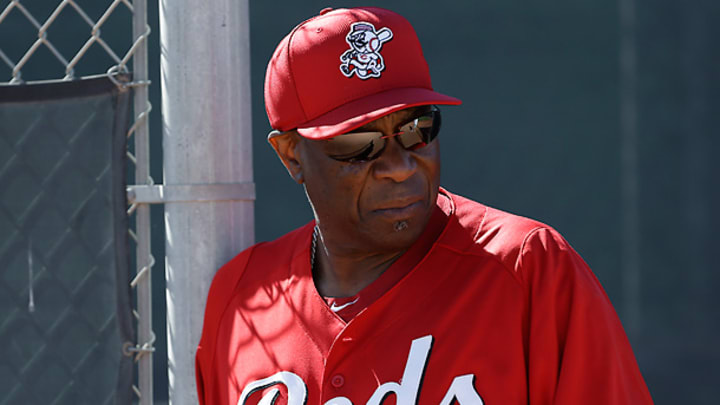True grit and the inevitability of the DH in both leagues

Dusty Baker was vocally displeased with Kirk Gibson after a dispute over whether to use the DH. [Paul Sancya/AP]
By Jay Jaffe
Monday's exhibition game between the Diamondbacks and Reds featured a frosty home plate exchange between managers Kirk Gibson and Dusty Baker as they traded lineup cards. Baker had asked Gibson if the teams could play using designated hitters, because he wanted to get some extra at-bats in for Shin-Soo Choo, who's dealing with soreness in his right quadriceps. It seemed like a reasonable request, something that happens with some frequency during the spring even between NL teams, but Gibson, who as the home manager had final say in the decision, refused to honor it because… well, apparently because he wanted to show he was more of an old school hardass than his opposite number, whose old school hardass-itude is hardly in question. Said Gibson:
"I had it happen last year with a team, they tried to put the DH in there and that's not the way it's done… I wanted to play a National League game. I notified them several times and they just wanted to do it their way and they couldn't do it. So they didn't like that. But we play by the rules here, that's the way it is. We go over there we play by their rules. It's very simple."
Perhaps it had something to do with Choo not being gritty enough to tough it out enough for Gibson, but if there's anything more pointless than putting a player at risk during an early March spring training game, it's pitchers hitting, and if there's anything pointless than pitchers hitting, it's pitchers hitting during spring training games. Thanks to Gibson's heroism, the Diamondbacks' Brandon McCarthy went 0-for-1 with a first-pitch groundout, while Aaron Hill, Paul Goldschmitt and Mark Teahen got pinch-hitting opportunities as five other Arizona pitchers failed to bat. On the other side, Johnny Cueto took three called strikes, while Choo and somebody named Tucker Barnhart went 0-for-1 in the pinch in place of the other Reds pitchers who came to the plate. Scintillating stuff.
Gibson can continue flexing his tough-guy muscles over NL rules, but the future clearly points in the other direction. With the move of the Astros to the AL to create two 15-team leagues, interleague games will take place all season long, which will put NL teams at a disadvantage from a roster standpoint. When I examined the history of DH production at Baseball Prospectus last year, I found that AL DHs had outproduced NL ones by a significant margin year after year, an average of 17 points worth of True Average (an expression of runs produced per plate appearance on a batting average scale after adjusting for park and league scoring environments) over the long haul, getting the upper hand in production at the position in all but two years since interleague play began in 1997. The gap appears to be widening, with margins of more than 20 points in five of the past seven years; last year it was 35 points (.277 to .242), as AL DHs hit a combined .256/.328/.430, while NL DHs hit just .234/.299/.389. Meanwhile, pitchers for both leagues hit a combined .129/.162/.166, with NL ones (.129/.162/.168) outproducing AL ones (.124/.148/.135) but boring the pants off of anybody watching.
In Sunday's New York Post, Joel Sherman pointed out the way the new interleague format works against NL teams from a roster standpoint, as well as some of the other issues in play. Sherman quoted Major League Baseball Players Association executive director Michael Weiner as being particularly concerned about the additional injury risk to his constituents:
“The issue of [AL] pitchers running and hitting and getting hurt is a real one… Teams are going to have to be more careful. No one pretends the need for an interleague game every day is a positive consequence of [moving Houston to the AL]. No one wants [interleague games] throughout the year. So [an increase in AL pitcher injuries] is a real possibility.”
As I noted last year, pitchers such as Jake Peavy, Mark Prior and Chien-Ming Wang — NL pitchers as well as AL ones — have suffered career-altering injuries while running the basepaths in recent years. Numerous others from both leagues such as Josh Beckett, Clay Buchholz, A.J. Burnett and Randy Johnson have gotten hurt swinging the bat, forcing them to the disabled list. There's no way baseball is a better game when it puts players at risk by making them do something with which they're so unfamiliar. Dodgers reliever Matt Guerrier may have had his tongue firmly in cheek in this Dos Equis spoof when he said, "Find out what it is in baseball that you don't do well, then don't do that thing," but in this case, it's true.

Jay Jaffe is a contributing baseball writer for SI.com and the author of the upcoming book The Cooperstown Casebook on the Baseball Hall of Fame.